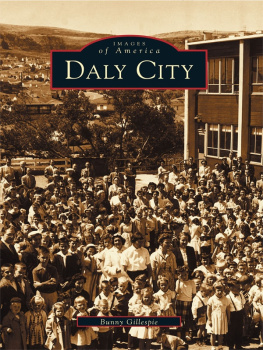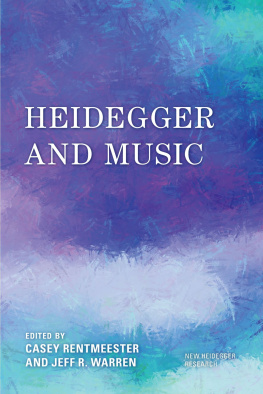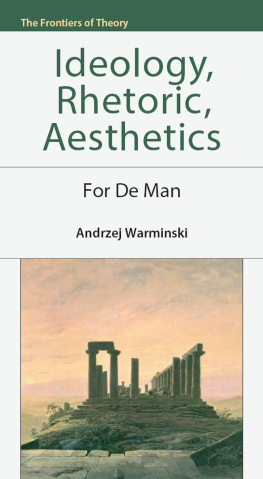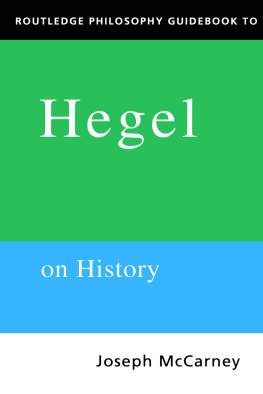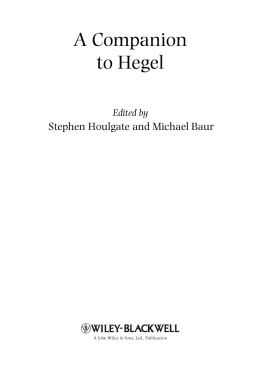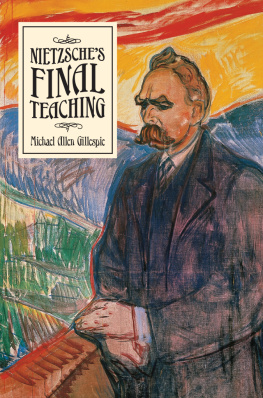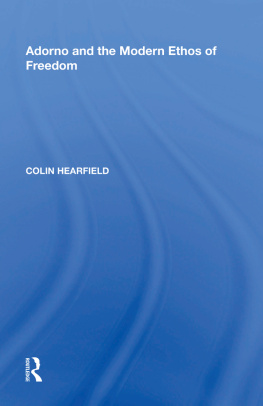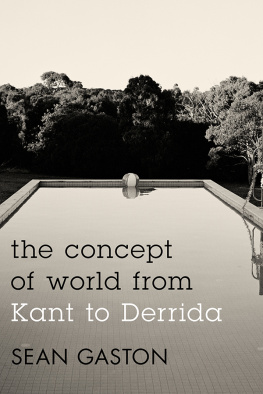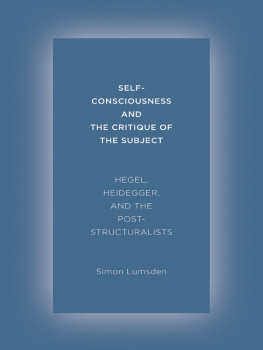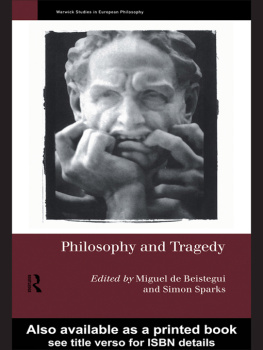
Hegel, Heidegger, and the Ground of History
Michael Allen Gillespie
The University of Chicago Press
Chicago & London
MICHAEL ALLEN GILLESPIE is assistant professor of political science at Duke University
The University of Chicago Press, Chicago 60637
The University of Chicago Press, Ltd., London
1984 by The University of Chicago
All rights reserved. Published 1984
Printed in the United States of America
93 92 91 90 89 88 87 86 85 5 4 3 2
ISBN-10: 0-226-29376-9
ISBN-13: 978-0-226-29376-9 (paperback)
ISBN-13: 978-0-226-30986-6 (e-book)
Library of Congress Cataloging in Publication Data
Gillespie, Michael Allen.
Hegel, Heidegger, and the ground of history.
Based on the authors thesis.
Bibliography: p.
Includes index.
1. HistoryPhilosophyHistory19th century. 2. HistoryPhilosophyHistory20th century. 3. Hegel, Georg Wilhelm Friedrich, 17701831. 4. Heidegger, Martin, 18891976. I. Title.
D16.8.G535 1984 901 84-2472
To my parents,
Charles and Eileen Gillespie
Contents
Preface
What is history? The importance and scope of this question for our times is only vaguely and then only imperfectly understood. Despite this lack of comprehension, and whether we like it or not, we dwell in the midst of this question, only rarely, if ever, experiencing it as a question but continually confronted with and challenged by its various answers. The question itself permeates all of our thinking about ourselves and our civilization, but it would be erroneous to assume that its importance is therefore merely theoreticalor to believe that the theoretical and spiritual, however distinguished from the practical and material, can in this case be completely or even largely dissociated from them, or that the political and economic well-being of man and his civilization is not inextricably bound up with his reflective consideration of himself, his political circumstances, and the state of his civilization.
There are two great intellectual forces in the modern world, science and history, and while they often seem mutually antagonistic they are in fact fundamentally complementary. Modern science determines the causal laws that govern the motions of matter but, in contradistinction to ancient science, eschews teleology and thus any determination of human ends. While it may thus present humanity with supreme knowledge of the mechanism of nature and open up the possibility for the technological conquest of the natural world and indeed of human nature itself, it does not and in principle it cannot tell us what we ought to do or how we ought to live. It is this question that history answers.
History of course is not modernitys only answer to this question. Empiricism for example answered this question with the doctrine of natural rights; rationalism discovered a solution in rational theology; humanism and classicism looked to ancient concepts of virtue and individuality; and transcendental idealism turned to teleological judgment and art. Moreover, many of these notions still exercise considerable force on contemporary thought and the political institutions that this thought informs. The continued importance of natural rights in the American context is only one example of this. Despite this importance, however, these other forms of thought have generally been unable to resist the encroachments of various forms of historical understanding. Gradually and often imperceptibly they have been permeated and overwhelmed by history. Even we Americans who in many ways have been least receptive to historical thinking find ourselves surprisingly dependent upon it. Despite our predisposition for scientific explanations, we seldom ask about what is simply true, or good, or just, or beautiful but rather about historical truth, or the judgment of history, or historical causes, or roots in history. We are concerned with the historical situation, with social progress, with human and technological development, with the process of industrialization and modernization, even characterizing those peoples and cultures which have not yet been wholly caught up in this process as underdeveloped or, charitably, developing. While this is still a far cry from the thorough historicism of the continental tradition, it is perhaps an ominous indication of the general tendency of our thought.
In the ancient world the consideration of humanity and its institutions fell within the purview of poetry or mythology and philosophy. Both claimed to comprehend not merely man but both man and the cosmos, and thus to establish mans place and duty in a cosmological hierarchy. In our world the task of such reflection upon human ends and duties has been assumed by history. For antiquity rhetoric was the chief form of practical and especially political deliberation: the wisdom of philosophy, which contemplated the general and necessary, was turned to a consideration of the particular and possible in and through rhetoric. In our times this classical function of rhetoric has been superseded or supplanted by propaganda, which implements the ideologically determined laws of history, and by public policy, which employs the knowledge gleaned by natural science to determine the most efficient means for the transformation of man and nature in accordance with historically determined social and technological goals.
Nowhere, however, is the importance and depth of the question about the nature and ground of history more evident than in the debate about its answer. Unfortunately, this debate is not merely the concern of learned men and societies, nor is it contested only with words: the debate about the nature and ground of history has become ideological and revolutionary; it has become bellicose and cataclysmic. The greatest event of our times, the Second World War, in whose unperceived shadow we stand, was in principle an internecine struggle about the nature of history. The current state of international tension is no less the result of the conviction and fervor of some and the perplexity and paralysis of others about the answer to this question.
As depressing as these reflections may be, they certainly would be made more bearable by the prospect of an unequivocal answer to the question of history or the dissolution of history itself as a way of understanding. But who today can soberly hope for such an answer or such a dissolution? Our thinking, our speaking, and our activity are so suffused with and dependent upon history and historical categories that any thought of such a transformation must be rejected by anyone who seriously considers the matter. In fact, such consideration must convince one that the influence of history upon our thinking and our lives is neither speedily nor steadily diminishing but rather continually increasing. History is and remains decisive for human life and thought, and the question of history thus becomes all the more important. We cannot forget and we dare not neglect this question: the truth, the value, the consistency, and the function of all historical concepts and hence the justice or propriety of their practical application is dependent upon a true or adequate answer to it. Without such an answer or the dissolution of the question itself, we are undoubtedly consigned to a debate between the convinced and the perplexed, with the ever-increasing danger of a new but nonetheless final solution. It is in this very real sense that the incipient world technological civilization, in which we place all our hopes and find all our fears, is essentially bound up with this question.
Next page





